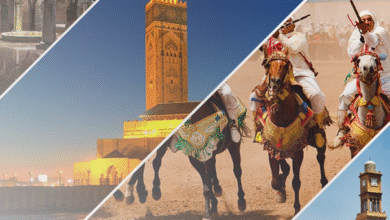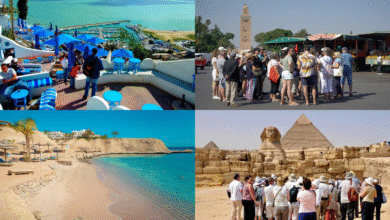Interview Mokhtar Zannad Taste Tunisia « Tunisia is a small country, but with great ambitions »
Mokhtar ZANNAD, central engineer, is a seasoned entrepreneur. CEO of Nielsen, he chairs Taste Tunisia, a cluster, initiated by GIZ, which brings together 13 actors from the agro-business sector and related professions, with the ambition of increasing the presence of Made in Tunisia in African markets. He tells us a little bit more about it, in this interview.
Tell us about Taste Tunisia, the genesis of this grouping and its objectives?
Taste Tunisia is two years old. This is a relatively recent initiative, born just before the Covid came to slow down its process. Originally, GIZ, through its PEMA program and in collaboration with CEPEX (Tunisia’s Export Promotion Center), thought of creating three clusters in Tunisia: one in health, the other in construction, and the third in agribusiness. Three sectors considered as exportable or at least where Tunisia has a comparative advantage. The idea, as with any cluster, and to quote an African proverb that I like, is: « if you want to go fast, you can go alone, but if you want to go far, let’s go together! » This is what we did with Taste Tunisia and the members of this cluster: we have identified targets, we go there together, we consult together, we spend together, which is cheaper and more efficient for each company … We work in partnership including between competitors, some of our members being in the same sector. The African agri-food market is so important that there is room for everyone. Which is a paradox: while 70% of arable land is in Africa, the continent imports nearly $ 50 billion (Editor’s note: $ 48.7 billion in 2019 for sub-Saharan Africa, according to the FAO). If we continue at this pace, by 2050 the bill will amount to more than 110 billion dollars, according to the African Development Bank (AfDB).
We started at 8, are now 13 members and are all set to go. We were supposed to do it in 2020, notably participating in fairs, inviting partners to Tunisia for Roadshows, but the Covid-19 has slowed us down. However, we have not stopped working, and the crisis has made us believe in it even more.
A relevant initiative given the entry into force of the AfCFTA. As such, what is Tunisia’s potential in terms of agro-business, and ultimately what are its « exportable » products and with what comparative advantages? Knowing that agriculture in Tunisia is an important economic sector (10% of GDP, 15% of jobs), with well-positioned sectors, olive, but also niches that are developing today, in particular in the bio. Is this know-how that Tunisia can share with its peers on the continent?
The ZLECAf, which has not really started, is not our real booster at the moment. For us, it is Comesa that Tunisia has just joined. This is why we initially targeted 5 countries (Côte d’Ivoire, Cameroon, Nigeria, Kenya and the DRC), in each of which Cepex has a regional office. Nigeria, an English-speaking country, a little complicated for some Tunisian companies, but which cannot be overlooked, the strategic Ivory Coast for West Africa, Kenya for Comesa, Cameroon, an important Central African country, and finally the DRC one of the largest countries in Africa.
The agro-industrial sector is very important in Tunisia. You were talking about organic products, for example. Tunisia is the 2nd African producer and the 24th worldwide. But Tunisia, in Africa, is nothing. I always repeat that intra-African trade barely reaches 17%, while intra-European trade exceeds 67%. We have a lot of work to do because Africa only represents 2% of our Tunisian exports, so not much. That said, agrifood products represent a quarter of these exports and in this area, agribusiness in Tunisia is highly developed. The sector is deployed over a very broad value chain, quite well represented by the members of our cluster. There are agro-food products but not only. For example, I make machines that are used to recover food waste and scraps, another member produces cold rooms, another grain products, oils, preserves… We even have specialized international trading companies. Finally, all types of products, equipment and services for the food industry. And we are only asking to expand.
It is precisely this value chain that allows us to work together, to prospect, to forge partnerships, to invest in markets by offering very broad expertise. We are used to exporting to Europe, with big name partnerships. The fact that we are close to Europe, with a long tradition of exchanges, since the 1970s approximately, means that we are mature today and that we can offer very good products and very good services for our continent.
Concretely, how do you support your members to these African markets? Of course, you can rely on the presence of the Cepex offices, but beyond that, you forge partnerships with institutional players, employers’ confederations, leaders of mass distribution?
The Tunisian is by nature a good salesperson with good expertise and thanks to this proximity to Europe, he can be a bridge. The Tunisian adapts, he can exchange as much one with the Lebanese in Ivory Coast as with his Kenyan or Cameroonian counterparts, without this colonial background, and with a strong cultural proximity … We must not forget either that we are the oldest country in Africa! With our age and experience, we have a lot to offer for a win-win, south-south partnership, because that is what it is all about.
You have targeted, first of all 5 countries, Ivory Coast, Cameroon, Nigeria, Kenya and the DRC, interesting in terms of their demography, but also because they are regional hubs and therefore gateways to entry to regional blocks. UEMOA, Comesa, Cemac, etc … How is penetration going so far?
To the extent that we cannot travel, we remain on the intangible and networking. We have already signed an agreement, a memorandum, with the German Agribusiness Alliance, our equivalent in Germany, and intend to do so with a cluster that is larger and older than us in Kenya. Nigerians expect the same and the appetite will come with eating. At the same time, we have launched market studies, we are starting to select on-site consultants for our B2Bs, among other things, because if the Cepex offices are useful, they are not sufficient even if the representatives on site are very enterprising. This is a good entry point, but we will have to rely on our personal initiatives. The most complicated thing today is having reliable data on these different markets. Thanks to our local relays and the experience of several members, we can obtain them. Since we are on a large value chain, it is important to have efficient distribution channels and above all good logistics. Africa is a large continent, with good and bad aspects, good and bad payers, we have the advantage of being able to exchange this information between us in order to reduce the possible risks. We have a member « MANUNTENTION SYSTEM» who is already established in Senegal and Ivory Coast. DIARI, WARDA and many other members export to many African countries. We therefore have an experience to share with our partners. For us, it is about allowing these entrepreneurs to be present in these countries with high potential and to have access to this data and to the network, knowing that we have members already established in Côte d’Ivoire and Kenya. What is planned in the second phase is to set up in 2 or 3 countries for example, in different forms, through a permanent showroom, a sales office, a factory, with the aim of making it all sustainable. GIZ will continue to support us for three years. It had entrusted the Deloitte firm with setting up this cluster, its structuring, and its mode of governance. The first year has been busy and exciting and we have taken the time to build a solid foundation. But we have to stand on our own two feet. We have already defined a five-year strategy. We plan to invest 750,000 Tunisian dinars (€ 230,000) this year for our various actions.
Are we looking into the future, with ambition: with the concept of the Europe-Mediterranean-Africa co-production, can we dream of seeing members of your consortium forming partnerships, in particular joint-ventures, for south-south co-location?
It’s not just imaginable, it’s what’s envisioned. Thanks to GIZ for initiating this project, but outside of Germany, we only talk among ourselves, Tunisians, Kenyans, Ivorians, Nigerians, Cameroonians, Congolese and only South-South. We are people on the ground. When we speak with our counterparts, we only speak of that, of cooperation, of co-location, with partnership projects on the spot, which takes time. Our advantage is that this is not about outright aggressive trading. The companies that want to join us offer themselves to the office. We have a clear and transparent procedure for studying the file. We invite him to introduce himself, to tell us about his ambitions, what he already does, what he wants to do and what he can contribute. While competition is welcome, it’s important to keep the current team spirit and stimulation. It is planned to expand the members but also the target countries. Today we have about ten requests in the pipe, some of which want, for example, to set up a company in Kenya or in Ivory Coast. Let’s not forget that the food industry is a matter of human health and that local regulations or barriers to entry are often very strict. Nothing will happen without South-South partnerships and the projects will happen. Everything has to be done, but the will and the desire are there.
These sub-Saharan partners, what do they ultimately expect from you, from this « Tunisian expertise »?
In West and Central Africa, we are well known, we « the children of Bourguiba », we have long been considered the Switzerland of North Africa. While Morocco is today a key player with significant financial and logistical resources, we have very strong complementarity. Some of our members, including myself, work with Moroccan partners. NIELSEN for example is a shareholder in a Moroccan company, LAND’OR has just opened a factory for the local market and West Africa. Any win-win formula is good to take and the African market is enormous. We are talking about 1.2 billion consumers, tomorrow 2.5! While the Tunisian revolution brought us complete freedom of expression and business, it also brought certain transitory economic difficulties. Suddenly I am pleasantly surprised to see, when I go to Benin, Cameroon or the Ivory Coast, more and more expatriate Tunisians working as directors in local companies recognized for their technical expertise in particular. Added to this, Tunisia has many success stories of Tunisian clubs that have been very successful on the continent, without much help from the Tunisian state, ultimately solo successes. We, behind, can follow the path that has been opened. This is a little less the case in East Africa, but with Comesa it will happen and faster than you think. I personally invited in 2019 Kenyans who are used to working with Egyptian companies and others. They visited our factory and several regions in Tunisia. They were « amazed » by Tunisia (those are their words) and were only waiting for the signing for Comesa. Without going there, last month I received an order for 2 machines. Everything is going well for the moment thanks to the pragmatic, square and well-oiled side of their English culture. The diversity of our Africa is fascinating and the adaptability and competence of the Tunisian are assets in this huge new market. Tunisia is a small country, but with big ambitions.
This is perhaps the alternative: while the Moroccans you mention have all the royal apparatus to deploy on the continent, finally, you Tunisian private sector, without support from the State, which has other emergencies to be managed, the alternative is perhaps to meet in consortia like yours and finally to go there alone… but together?
Perfectly. If we have to draw a parallel with Morocco, which has an African strategy dating from the late Hassan II, in Tunisia we get the impression that there is no clear African strategy. Today, the state deals with emergencies and we, private entrepreneurs, are used to deploying alone. In the end, between Morocco and Tunisia, there are 2 different paths, but ultimately a common will, and a common success. As I said earlier, one person’s success benefits the other. Signing a contract by bringing in financing, insurance for the construction of hundreds of homes, that helps. We don’t have that in Tunisia, even though we had the first regional bank deployed in sub-Saharan Africa before it was acquired by Attijari. But today, this Moroccan real estate developer calls on a Tunisian consultancy firm. Success can be shared. For me, the Tunisian state is just a service provider and should be a facilitator. Otherwise, we’re used to fending for ourselves. Our entrepreneurs rarely travel in official delegation with meetings in hotels and embassies. We go out into the field, we go to our customers or to work sites and we are appreciated for that. This allows for more personalized and lasting relationships. Africa is subjective, it is family, it is relational based on trust. If we are right in our boots it can last for generations …
To conclude, finally, with regard to the private sector, this is the achievement of the revolution: this freedom to go to other markets without the state getting involved, a freedom to conduct business?
It is true that in the days of Ben Ali it was better to be inconspicuous. I am lucky to be small. Small fish are of no interest to big sharks. Which is not worse. But it is true that today the freedom to undertake is there, we can bang on the administration table, claim when we do not agree what was not possible before without risking a control tax. Today justice is there. When we have a right we acquire it. Unfortunately, there are social problems in Tunisia and the middle class is getting poorer. All the great nations in transition have experienced the same thing. So yes for ten years, it is true that we are suffering, there are tensions at the level of the various companies, we have learned to negotiate, to give and to adopt a different style of management. We adapt to it more or less quickly, more or less well, but what is certain is that today, whoever wants to work and undertake, has the means to succeed without fear of a backlash. The revolution may take a long time to digest, but it will be successful because Tunisians are hard-working, inventive and persevering.







